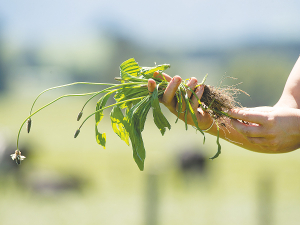NZ Catchment Groups Thrive with ‘Source to Sea’ Approach
The most successful catchment groups in NZ are those that have 'a source to sea' approach.
 Recent Massey University research has found Ecotain plantain can reduce nitrogen loss from dairy farms by 20 to 60%.
Recent Massey University research has found Ecotain plantain can reduce nitrogen loss from dairy farms by 20 to 60%.
Dairy farmer Thomas Read is one of more than 100 Kiwi farmers trialling a unique plant on their farms to help improve water quality.
Plantain is a nutritious leafy herb cows like to eat - and it has a superpower. Recent Massey University research has found Ecotain plantain can reduce nitrogen loss from dairy farms by 20 to 60%.
That’s a win for the environment, as less nitrogen going through groundwater into waterways helps improve water quality.
Read is a partner farmer in the DairyNZ-led Tararua Plantain Project, which supports farmers to incorporate plantain in their pastures as part of their cows’ regular diet.
The project sees farmers, scientists, councils, DairyNZ specialists and community members working together with a common goal of reducing environmental footprint.
Working with partners, DairyNZ carries out research with farmers on their properties, and shares results and advice with other farmers on how to best manage plantain.
The project has achieved great results, with 88 of the catchment’s 263 dairy farms so far planting plantain on their properties and improving water quality in streams on their farms. Water quality monitoring helps the farmers understand where to focus their environmental efforts.
Read says he finds plantain an exciting option. Since he’s started using it, nitrogen loss from his farm has reduced by 10 percent. He’s gradually increasing the proportion of plantain in his pasture to achieve even better results.
He and his wife Jennifer have planted 12,000 trees across their farm including alongside waterways, which helps improve water quality. They’re also fencing wetlands that make up 10 percent of their farm to protect them. Wetlands can improve water quality, boost biodiversity and provide habitat for birds and fish.
The partners in the five-year Tararua Plantain Project are DairyNZ, Agricom, MPI, Fonterra and Nestlé. Read is now part of a farmer advisory group of the national DairyNZ-led Plantain Potency and Practice research and development programme.
This $22 million programme brings partners, farmers, industry, and government together to research plantain and develop strategies to support farmers to successfully adopt it on their farms.
The goal is for plantain to be widely adopted throughout New Zealand. The programme works closely with 22 partner farmers in Waikato, Bay of Plenty, Tararua, Canterbury and Southland, and will share lessons with all dairy farmers.
A key objective of the programme is to tailor advice for local areas, including looking at the effects of different soil and climate conditions. It’s important farmers know how to best manage plantain in their local area.
The programme has two large-scale farm trials underway, quantifying Ecotain plantain as an effective solution to help dairy farmers continue playing their part in improving water quality.
At the Massey University farm trial, scientists are measuring nitrogen leaching from paddocks grazed by 80 dairy cows. After two years, results show reduced nitrogen leaching by 20 to 60 percent in perennial ryegrass and clover pastures containing 30 to 50% Ecotain plantain.
Initial results from the programme’s Lincoln University study in Canterbury, on lighter soils under irrigation, show similar trends to the Massey University trial. More data are being collected.
The programme uses Ecotain environmental plantain from Agricom because it has proven effectiveness. An evaluation system is available to assess the environmental benefits of all plantain cultivars sold by a range of providers.
The seven-year Plantain Potency and Practice programme is funded by DairyNZ, Ministry for Primary Industries’ Sustainable Food and Fibre Futures Fund, PGG Wrightson Seeds and Fonterra.
New Zealand and Chile have signed a new arrangement designed to boost agricultural cooperation and drive sector success.
New DairyNZ research will help farmers mitigate the impacts of heat stress on herds in high-risk regions of the country.
Budou are being picked now in Bridge Pā, the most intense and exciting time of the year for the Greencollar team – and the harvest of the finest eating grapes is weeks earlier than expected.
The Real Estate Institute of New Zealand (REINZ) has released its latest rural property report, providing a detailed view of New Zealand’s rural real estate market for the 12 months ending December 2025.
Rural retailer Farmlands has released it's latest round of half-year results, labeling it as evidence that its five-year strategy is delivering on financial performance and better value for members.
OPINION: "We are back to where we were a year ago," according to a leading banking analyst in the UK, referring to US president Donald Trump's latest imposition of a global 10% tariff on all exports into the US.
OPINION: Expect the Indian free trade deal to feature strongly in the election campaign.
OPINION: One of the world's largest ice cream makers, Nestlé, is going cold on the viability of making the dessert.